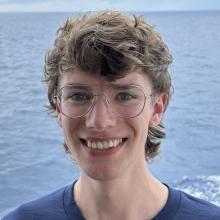
Harold Carlson
Tell us about your work/ research. What kinds of things do you do?
I'm curious about how corals and sponges form habitat for fish in the deep-sea. This research is critical to protecting deep-sea ecosystems form the many anthropogenic threats they face. I have been working with the Deep-sea Animal Research Center to annotate ROV and baited camera videos taken from deep-sea ecosystems around the Pacific. As a lab we work to count and identify the animals that appear in ROV dives and baited camera deployments, often with the help of taxonomic experts from around the world. Annotated deep-sea videos are highly valuable to ecologists like me. Video data, combined with regional oceanographic and geological information, can tell us a lot about the biogeography (how and why organisms are distributed geographically) of deep-sea animals.
What sparked your initial interest in your career?
I grew up in land-locked Minnesota, so the ocean fueled my imagination as a strange and mysterious world. BBC's Blue Planet introduced me to the deep-sea in 5th grade, and I was hooked! Inspired by science communicators like Carl Sagan, I realized that a having a career in science was the way I wanted to explore the deep ocean.
Who influenced you or encouraged you the most?
I've been so lucky that my family and my teachers have supported my dream of becoming a marine scientist. My parents (both teachers) always nurtured my love of science, but they make sure to remind me not to forget the importance of the arts and humanities. I've had many great teachers over the years, but I am especially grateful to my undergraduate research mentors for helping my thought the early stages of becoming a researcher.
What element of your work/ study do you think is the most fascinating?
It has been said a million times, but deep-sea science perfectly exemplifies the joy of discovery. This job allows us to explore beautiful parts of nature that no human has ever laid eyes on and share it with the world. What more could you want in life?!
How did you get involved with Ocean Exploration Trust? How did you become part of the expedition team?
In March of 2024 I had the privilege of joining a National Geographic Pristine Seas expedition to Palau. Members of our lab at UH have been training to help NatGeo deploy their baited camera systems designed to study deep-sea scavengers. In Palau we were able to collect a relatively large baited camera dataset. When I learned that the Nautilus was going to Palau later in 2024, I wanted to join. I contacted Dr. Daniel Wagner and expressed my interest in Palau's unexplored slopes and seamounts, and he invited me to join the upcoming cruise. I'm so excited to see what we will find with Hercules and how this expedition might complement NatGeo's expedition.
What other jobs led you to your current career?
Along the way to becoming a deep-sea ecologist I tired my hand at several aspects of marine science. I always knew the deep-sea was my passion, but I wanted to discover what skills and topics interested me most. I worked in a microbiology lab, and a coral genetics lab during undergrad. The job that most directly lead to my current position was my Hollings internship with NOAA Ocean Exploration. During the summer of 2021 I virtually participated in an Okeanos Explorer ROV cruise in the North Atlantic. This was my first exposure to video annotation and deep-sea coral research. Before grad school I also volunteered on a NOAA trawl survey in the Bering Sea. This was my first research cruise and my first foray into the study of fish.
What are your degrees and certifications?
Bachelor of Science in Biological Sciences - University of Southern California 2022
Bachelor of Art in Earth Sciences - University of Southern California 2022
What are your hobbies?
Living in Hawaii, snorkeling and tide-pooling are my favorite weekend activities. I also love art history and visiting museums. Alongside my deep-sea career ambitions, I have the secondary goal of becoming a pro cave explorer.
What advice would you give someone who wants to have a career like yours?
Explore many academic and professional avenues with an open mind. It is important to be able to try a bunch of stuff and decide what you are best at and what you are most passionate about. This will require you to step outside your comfort zone, and sometimes you will have to recognize when something just isn't a good fit for you. Be curious and never be afraid to switch things up!
This job allows us to explore beautiful parts of nature that no human has ever laid eyes on and share it with the world. What more could you want in life?!
Expeditions
Harold participated in the following Ocean Exploration Trust expeditions:
